Welcoming a dog into your home brings immense joy, but also a significant responsibility for their health and well-being. Part of this care involves understanding what your furry friend can and cannot eat. While some human foods are safe and even beneficial for dogs, many common household items can be highly toxic, leading to severe illness or even death. Pet poisonings are a serious threat, with hundreds of thousands occurring annually in the United States, and common foods are a major contributor. This guide will serve as your essential “cheat sheet” to help you distinguish between foods that are harmful and those that are safe, ensuring your beloved canine companion stays healthy and happy. Knowing what your dog can and cannot eat is crucial for preventing emergencies and maintaining their optimal health.
Why Certain Foods Are Dangerous for Dogs
Canine digestion and metabolism differ significantly from humans, meaning dogs process certain substances very differently. What might be harmless for us can be incredibly toxic to them. For instance, dogs metabolize theobromine and caffeine found in chocolate much slower than humans, allowing these substances to build up rapidly in their systems and potentially become fatal. Similarly, while humans can safely eat cherries, the cyanide in their pits, stems, and leaves can pose a problem if ingested by dogs in large quantities. Cherry pits can also cause digestive upset and diarrhea due to their indigestibility.
Food toxicity can also vary based on a dog’s size, breed, and overall health condition. Smaller dogs, for example, are often more vulnerable to toxins due to their lower body weight. Puppies and elderly dogs, or those with pre-existing conditions like diabetes or kidney disease, may also be at higher risk. Therefore, it is always vital to consult your veterinarian if you have any questions about foods your dog should avoid. Understanding these differences is key to knowing what food is bad for puppies and dogs of all ages.
Top Toxic Foods You Must Avoid Feeding Your Dog
Many common household foods are dangerous, and often toxic, to dogs. Being aware of these items is the first step in preventing accidental ingestion and protecting your pet. The following list details some of the most common and dangerous foods your dog should never eat.
Alcohol
Alcohol can have a deadly effect on dogs and cats, even in small amounts, due to their smaller body size. Symptoms of alcohol poisoning in dogs mirror those in humans, including vomiting, breathing difficulties, coma, or even death. It is crucial to keep all alcoholic beverages and products containing alcohol far out of your dog’s reach.
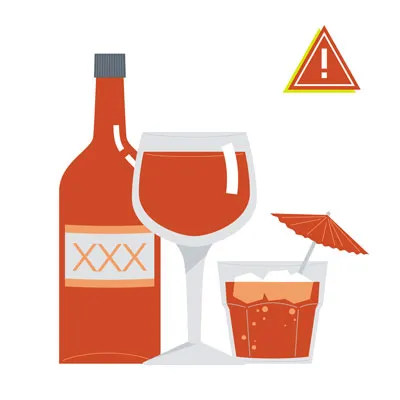 Alcohol can be deadly for dogs even in small amounts, leading to severe health issues.
Alcohol can be deadly for dogs even in small amounts, leading to severe health issues.
Apple, Apricot, Cherry, and Plum Seeds/Pits
While the fleshy parts of apples are generally safe for dogs, the core and apple seeds contain cyanide and should be avoided. Similarly, the seeds and pits of apricots, cherries, peaches, and plums also contain cyanide. Ingestion can lead to severe symptoms such as vomiting, irregular heartbeat, seizures, coma, and even death, as red blood cells are unable to properly carry oxygen. Always remove pits and seeds before offering these fruits.
Avocado
Avocados are not a good choice for dogs. While the exact toxic mechanism in dogs is debated, some dogs have reportedly suffered myocardial damage after consuming avocados. Additionally, an intact avocado pit can cause a dangerous obstruction in your dog’s gastrointestinal tract. It’s best to avoid this fruit entirely.
Broccoli
Broccoli contains isothiocyanates, which can be harmful to pets in very large doses. Although small amounts might be tolerated occasionally, it is generally safer to avoid broccoli due to the availability of many healthier alternatives. Broccoli stalks can also pose a choking hazard or cause an obstruction in a dog’s throat.
Caffeine and Coffee Grounds
Caffeine contains methylxanthines, which can cause potentially fatal symptoms in dogs, including diarrhea, vomiting, seizures, and an irregular heartbeat. Even small amounts of coffee grounds or highly caffeinated drinks can cause a dog’s heart to race, leading to tremors, arrhythmia, and difficulty breathing.
Chicken and Turkey Skin, Ham, and Other Fatty Cuts of Meat
Fatty cuts of meat, including chicken and turkey skin, ham, and other high-fat items, should be avoided. Their high-fat content can trigger acute pancreatitis, a severe and life-threatening illness. Furthermore, never feed your dog cooked bones from chicken or turkey, as they can splinter and cause bowel obstructions or perforate the stomach or intestines, leading to fatal abdominal infections.
Chocolate
Chocolate toxicity is a frequent cause of pet poisoning. All chocolate products are dangerous for dogs because they contain theobromine, a lethal component, along with caffeine. Darker chocolates, like baker’s chocolate, contain higher levels of theobromine, making them particularly dangerous. Some sugar-free chocolates also contain xylitol, which is highly toxic to dogs.
Dogs and cats cannot metabolize chocolate as effectively as humans. Symptoms of chocolate ingestion can include hyperactivity, vomiting, diarrhea, pancreatitis, abnormal heart rhythm, and seizures. If your dog ingests any amount of chocolate, contact your veterinarian immediately.
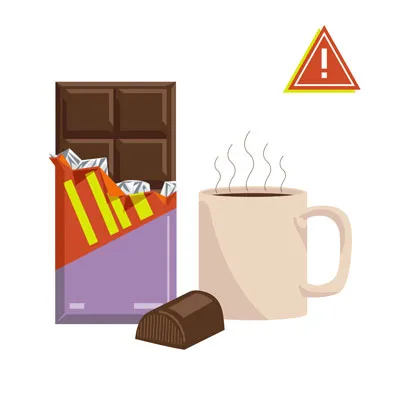 Dark chocolate contains high levels of theobromine, making it extremely toxic for dogs.
Dark chocolate contains high levels of theobromine, making it extremely toxic for dogs.
Grapes and Raisins
Grapes and raisins are highly dangerous to dogs, capable of causing serious issues like kidney failure. The tartaric acid in these fruits is toxic to a dog’s kidneys, and even a few bites can wreak havoc. Symptoms of grape or raisin poisoning include vomiting, diarrhea, loss of appetite, and changes in urination patterns, potentially leading to complete absence of urine.
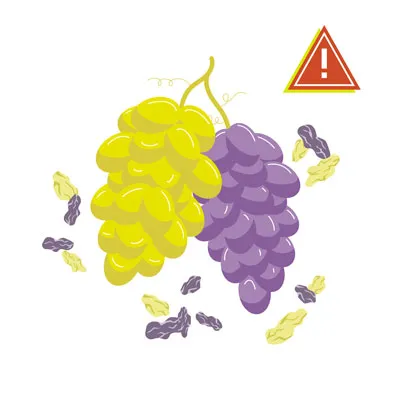 Grapes and raisins can cause severe kidney failure in dogs, even in small quantities.
Grapes and raisins can cause severe kidney failure in dogs, even in small quantities.
Macadamia Nuts, Almonds, and Pistachios
Macadamia nuts are toxic to dogs, causing symptoms such as weakness, overheating, and vomiting. As few as six nuts can lead to severe poisoning in a small dog, although the exact mechanism of toxicity remains a mystery. Other nuts, like almonds and pistachios, are problematic due to choking hazards or if they are flavored or salted. It’s generally best to keep all nuts away from your dog.
Milk and Dairy Products
The suitability of milk and dairy products for dogs is on a case-by-case basis. While some dogs tolerate them well, many are lactose intolerant or allergic, experiencing diarrhea and gas after consuming cow’s milk. Ice cream is particularly bad due to its high sugar and fat content. Small quantities of lower-fat cheese may be acceptable as an occasional treat, but always opt for plain, unsalted varieties and consult your vet.
Mushrooms
It is safest to avoid feeding your dog any mushrooms. Wild mushrooms can contain a variety of toxins that may cause kidney and liver failure, vomiting, diarrhea, hallucinations, and damage to red blood cells. Even store-bought white mushrooms, while possibly safe when thoroughly washed, are best avoided in favor of other, safer treats.
Nutmeg and Cinnamon
Nutmeg should never be fed to dogs, as the compound myristicin can cause hallucinations and severe vomiting. Its effects are more pronounced in high doses or in smaller dogs. Cinnamon, while not strictly toxic, can irritate a dog’s mouth and, in larger amounts, lead to low blood sugar, which can have serious health implications.
Onions, Garlic, Chives, and Leeks
All members of the allium family, including onions, garlic, chives, and leeks, are unsafe for dogs. These plants contain sulfoxides and disulfides, which can damage a dog’s red blood cells and lead to anemia. Onion and garlic powders are often found in prepared foods, so carefully read labels. Certain Japanese breeds, such as Akitas and Shiba Inus, are particularly sensitive to allium plants, but they are dangerous for all dogs.
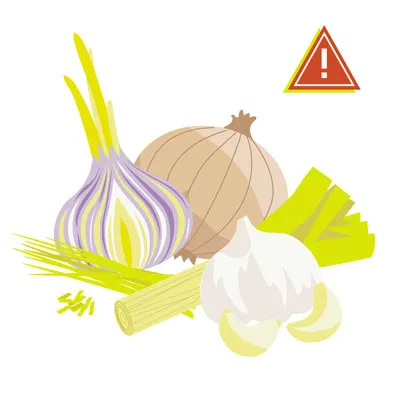 Onions, garlic, chives, and leeks are toxic, damaging red blood cells and causing anemia in dogs.
Onions, garlic, chives, and leeks are toxic, damaging red blood cells and causing anemia in dogs.
Salt
Excessive amounts of salt can disrupt the fluid balance in a dog’s cells, leading to tremors, seizures, diarrhea, or even a coma. Keep salty snacks like potato chips, as well as items containing rock salt or homemade play dough, away from your dog.
Spicy Food
Spicy foods can cause significant distress for dogs, leading to vomiting, stomach ulcers, or diarrhea. These conditions can be painful for your pet and potentially incur emergency veterinary costs. It’s best to keep your dog away from anything spicy.
Sugar-Free Gum and Candy (Xylitol)
Xylitol is an artificial sweetener found in many sugar-free human foods, including gum, candy, and baked goods. In dogs, even small amounts of xylitol can cause a rapid and dangerous drop in blood sugar, leading to weakness and seizures. Some dogs may also experience liver failure. Dog poisoning cases involving xylitol are on the rise, with just five pieces of gum potentially fatal to a 65-pound dog.
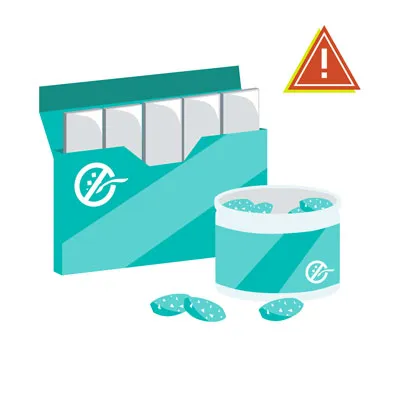 Xylitol, an artificial sweetener in sugar-free products, is highly toxic and can cause liver failure and seizures in dogs.
Xylitol, an artificial sweetener in sugar-free products, is highly toxic and can cause liver failure and seizures in dogs.
Tomatoes and Raw Potatoes
Tomatoes and potatoes are safe only in certain forms. Ripe red tomatoes are generally fine, but the green parts of the tomato plant and unripe green tomatoes contain solanine, which is toxic to dogs. Similarly, cooked potatoes (baked or boiled, without additives) are safe in small amounts, but raw potatoes also contain solanine and should be avoided.
Tobacco
Tobacco and nicotine-containing products are extremely dangerous for dogs. Exposure can lead to vomiting, diarrhea, rapid breathing, agitation, abnormal heart rate, wobbliness, muscle weakness, and seizures. More significant exposure can cause blue gums and coma, ultimately proving fatal. If your dog ingests any tobacco product, seek immediate veterinary attention.
Yeast and Raw Dough
Yeast and raw dough are unsafe for several reasons. Raw dough can expand in a dog’s stomach, causing severe pain and potentially life-threatening torsion or rupture. Additionally, the yeast and sugar in raw dough can ferment, producing alcohol and leading to alcohol toxicity, which requires immediate medical intervention.
Raw Meat
Never feed your dog raw or undercooked meat. Raw meat can harbor dangerous bacteria like Salmonella or E. coli, which can harm dogs as well as humans. Furthermore, bones in raw meat can pose a choking hazard or cause internal injuries. For a complete guide on safe proteins, you might want to look into what is the one meat that dogs should never eat.
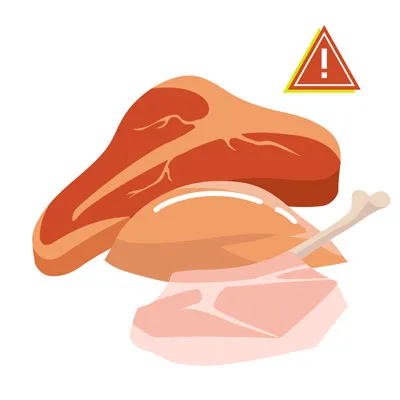 Raw meat can contain harmful bacteria like Salmonella or E. coli, posing risks to dogs.
Raw meat can contain harmful bacteria like Salmonella or E. coli, posing risks to dogs.
Rhubarb
Rhubarb is not safe for pets. Its leaves contain soluble calcium oxalate crystals which, if eaten in sufficient quantities, can bind with calcium in the body. This can lead to a dangerous drop in calcium levels and potentially result in renal failure. Symptoms include tremors, weakness, drooling, bloody urine, and changes in thirst and urination.
Star Fruit
Similar to rhubarb, star fruit also contains soluble calcium oxalate crystals and should not be given to dogs.
Flavored Water and Seltzer Water
It is always best to give your dog fresh, plain water. Flavored and carbonated waters can contain added sugars, salts, or artificial sweeteners that are dangerous for pups. Plain seltzer water might be acceptable in very small, urgent amounts, but it can lead to gas and bloating.
What Dogs Are Most at Risk?
While all dogs should avoid toxic foods, some are at greater risk if they consume them:
- Small Breeds vs. Large Breeds: Smaller dogs are more vulnerable due to their lower body weight, especially with substances like chocolate.
- Puppies: Young dogs have less developed digestive and immune systems, increasing their risk from certain substances, including raw dog food.
- Elderly Dogs: Older dogs may be at higher risk due to pre-existing health conditions.
- Dogs with Pre-existing Conditions: Health issues like diabetes or kidney disease can put a dog at greater risk from toxic foods.
How to Prevent Your Dog from Eating Toxic Foods
Preventing your dog from ingesting unsafe human foods requires vigilance and proactive measures. Accidents can happen, but these steps can minimize the risk:
- Store Foods Out of Reach: Keep all toxic and dangerous food items on high shelves or securely locked in cabinets that your dog cannot access.
- Avoid Feeding Dogs from Your Plate: Resist the temptation to share food from your plate or while cooking in the kitchen. It is safest to only provide treats specifically made for dogs. For more on safe human foods, check out what is good for dogs to eat human food.
- Educate Family Members and Guests: Ensure everyone in your household, including children and guests, understands the importance of not sneaking food to your dog, regardless of how much they beg.
- Be Careful During Holidays: Holidays often involve more food, busier environments, and distractions. This can make it easier to let your guard down, so exercise extra caution with food during these times.
If your precautions fail and your dog eats something toxic, being prepared can help you act quickly. Keep emergency veterinary contact information readily available, including numbers for 24/7 services and poison control.
What to Do if Your Dog Eats Something Toxic
If your dog consumes toxic food, immediate action is crucial. You should be familiar with common symptoms of food toxicity, which vary depending on the substance ingested but can include listlessness, distress, pain, vomiting, bloody stools, or a bloated, hard stomach. A bloated stomach can be extremely painful and may even rupture if not treated promptly.
If you observe any of these symptoms or suspect your dog has eaten something toxic, do the following:
- Call Your Veterinarian or Poison Control Immediately: Timing is vital. Prompt veterinary care often leads to more successful treatments and shorter hospitalization.
- Be Prepared with Information: Have all important details ready, such as the type of food eaten, the approximate amount consumed, and the time of ingestion.
- Avoid Home Remedies: Do not attempt home remedies, such as inducing vomiting, unless specifically instructed by your veterinarian. The appropriate action depends on the ingested substance, and some remedies can be harmful.
Safe Human Foods Your Dog Can Enjoy
While the list of foods dogs cannot eat is extensive, there are also many human foods that are perfectly safe and healthy for your dog to enjoy in moderation. Some popular safe choices include plain, cooked chicken or beef (in very small amounts, without skin, fat, or bones), apples (without core and seeds), green beans, carrots, and blueberries. These can be excellent, nutritious treats. If you’re looking for more guidance on a balanced diet, you can refer to what should you feed a dog.
Conclusion
Navigating the world of human foods for your dog can be challenging, but understanding what food you should not feed your dog is paramount to their safety and health. From commonly known dangers like chocolate and grapes to less obvious threats like xylitol and raw dough, being informed is your best defense against pet poisonings. Remember that canine digestive systems are unique, and what’s safe for you may be deadly for your pet.
By storing dangerous items out of reach, avoiding feeding from your plate, educating your household, and being extra cautious during holidays, you can significantly reduce the risk of accidental ingestion. In the event that your dog does eat something toxic, immediate contact with your veterinarian or poison control is essential. While vigilance is key, rest assured that there are also many safe and healthy human foods your dog can enjoy as treats. Always consult with your veterinarian if you are ever unsure about a specific food, ensuring your beloved companion lives a long, healthy, and happy life.
References
- “Top 10 dog poisons,” Hilary Parker (5/2023), WebMD.
- “What happens if a dog eats chocolate?” (10/2023), Colorado State University.
- “Fruits and vegetables dogs can or can’t eat,” (3/2024), American Kennel Club.
- “What to do if your dog drinks alcohol,” Jerry Klein (7/2023), American Kennel Club.
- “Can dogs eat apples?” Hector Joy (12/2022), PetMD.
- “Can dogs eat plums?” Katie Koschalk (7/2023), Chewy.
- “Avocado (Persea spp) Toxicosis in Animals,” Cristine Hayes (9/2024), Merck Veterinary Manual.
- “People foods to avoid feeding your pets,” (n.d.), ASPCA.
- “People foods dogs can and can’t eat,” (3/2024), American Kennel Club.
- “Can dogs eat nuts?” Amanda Ardente (1/2023), PetMD.
- “Can dogs drink milk?” Sandra C. Mitchell (1/2024), PetMD.
- “Can dogs have nutmeg?” Barri J. Morrison (11/2023), PetMD.
- “Onion, garlic, chive, and leek poisoning in dogs,” Renee Schmid et al. (2024), VCA Animal Hospitals.
- “Can dogs eat tomatoes?” Anna Burke (10/2024), American Kennel Club.
- “Can dogs eat potatoes?” Katherine Ripley (11/2023), American Kennel Club.
- “What to do if your dog eats a cigarette butt,” (6/2023), American Kennel Club.
- “Dough & dogs: Why it’s bad and what you can do,” Lisa Goldstein (7/2024), Preventive Vet.
- “Rhubarb,” (n.d.), Pet Poison Helpline.
- “Can dogs drink carbonated water?” Heather Logue (n.d.), Rover.
- “What fruits can dogs eat?” Ellen Malmanger (2/2024), PetMD.
- “Can dogs have green beans?” Anna Burke (8/2022), American Kennel Club.
- “About pet food safety,” (4/2024), CDC.
